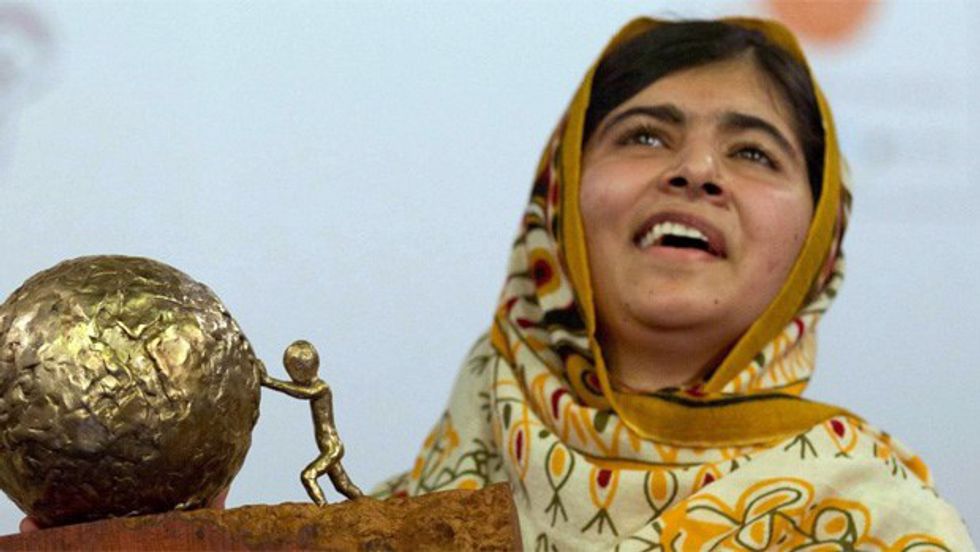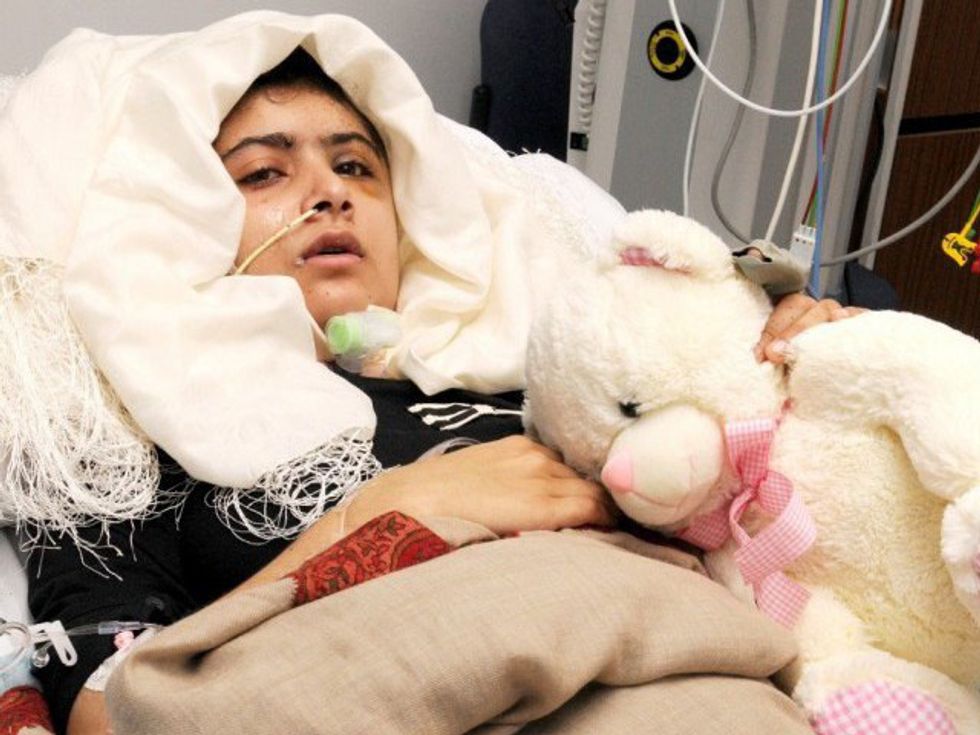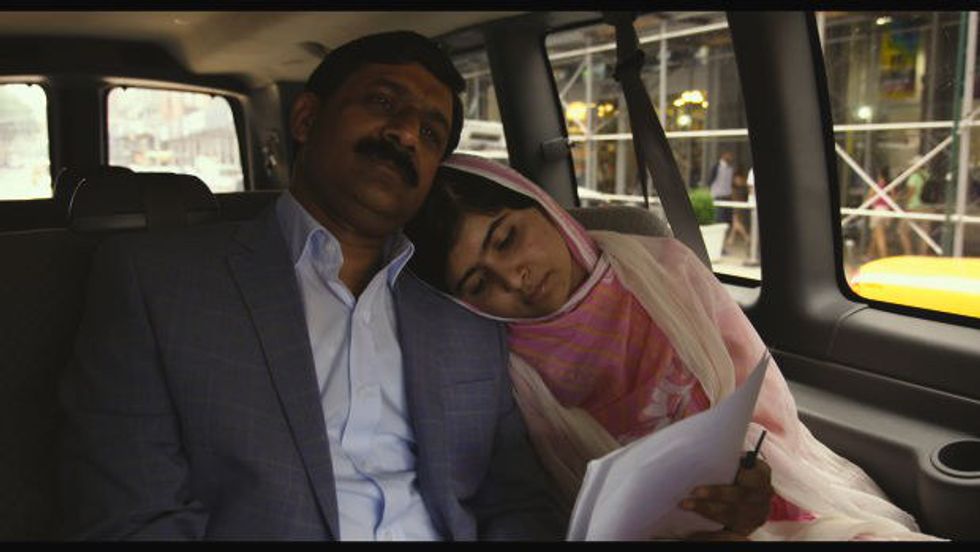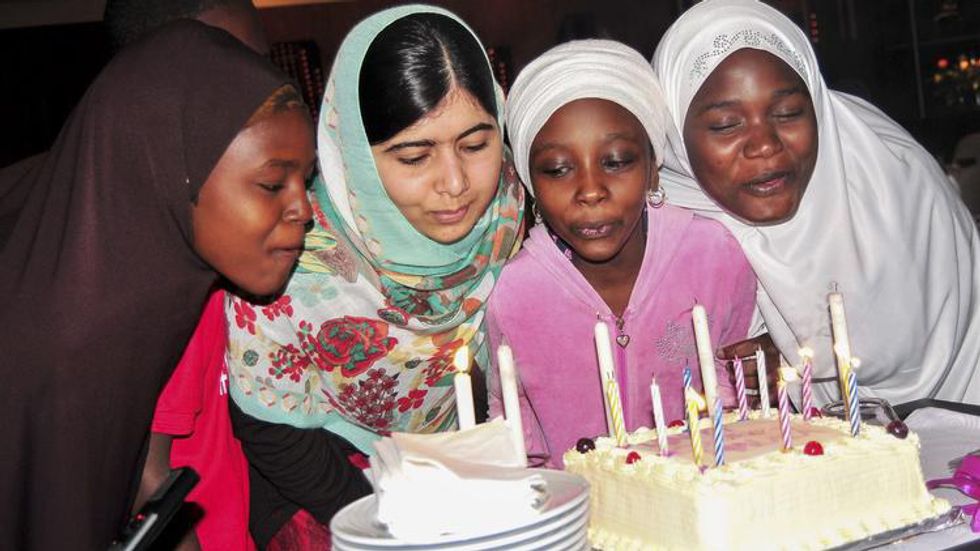Just earlier today, I went to see the film He Named Me Malala. For those of you who don’t know, Malala Yousafzai is a Pakistani teenager and activist who was shot in the head by the Taliban after daring to demand girls be offered the same educational opportunities as boys.
Miraculously, the bullet that hit Malala in the forehead failed to kill her; after spending a considerable amount of time in recovery, Malala is better than ever and even more devoted to her beliefs. She is the youngest Nobel Peace Prize laureate, winning the prestigious prize in 2014 at age seventeen.
He Named Me Malala is a documentary depicting Malala’s life, that of her parents, and of course the issues she is fighting to resolve. Unless otherwise stated, all of the information in this article was provided by the film. The film is composed of interviews of Malala and her family, paired with beautiful moving artwork to portray flashbacks and mythology. She is an unbelievably inspiring woman to me, and I hope this article does her justice and allows others to fully appreciate her cause.
In Malala’s early teens, the Taliban stationed themselves in her hometown of Swat. They began a continuous radio transmission that could be heard by everyone at any given time of the day. At first, the speeches given over the radio were aligned with the religious scripture with which her community had grown up and appreciated. The broadcasts said no other religion gives women more freedom than Islam. The voice would directly address women, making them feel important and respected. The Taliban brought the community into its confidence with these broadcasts.
Then they began to censor the media. They would take all the books and CDs and DVDs that weren’t to their liking and build a bonfire with them in the middle of communities. If a member of the Taliban heard a family watching TV, he would break into their house, remove the TV, and burn it. They did not like images of “immodest” women, and so would scrape the faces of women that fit this description (uncovered knees, elbows, and hair) off billboards.
The Taliban began to target the police force, eliminating the first call for help anyone could make.
Then they turned to schools. The Taliban bombed and destroyed over 400 schools, including three in Swat in one night. They then decreed that any type of education besides religious education was unnecessary for women. They forbid girls and women from attending school, on fear of death.
As Malala and her father pointed out, female education and independence is a threat to the Taliban. They are scared of it, and so they try to eliminate it.
With her father’s aid, Malala slowly began to advocate for freedom. She’d sneak to school against the law. First, she began communicating with a BBC representative, telling the journalist about the state of terror in which she was living. These interactions were published under a false name, for the sake of Malala’s safety.
But that was not enough. Eventually Malala decided to step in front of the camera to speak for women’s cause, even though she knew that she would be putting her own life in danger. Still, no one thought they’d kill a child.
The Taliban attacked Malala’s school bus when she was fifteen. Two of her friends were shot and injured, and Malala herself was hit in the forehead. No one thought she would survive. After several surgeries and a considerable amount of time in a coma, however, Malala awoke and began her physical recovery in England, where she was transported. Although she has regained almost all her physical capabilities, now the left side of her face does not work properly; in the film she mentions her odd new smile.
The Taliban are shameless regarding their attack on this brave girl, saying that if Malala dares return to Pakistan, they will kill her. In the film, they quote a member of the Taliban delivering such a death threat, who says that if he is willing to kill himself, no one else means anything to him. Even so, Malala dreams of the day she can return home.
Malala says she has never felt angry toward the Taliban, or the specific (nameless) man who shot her. She says that Islam teaches forgiveness, and she tries to live by that principle.
Perhaps the most extraordinary aspect of He Named Me Malala is how ordinary Malala is. When I imagine a Nobel Peace Prize winner, my mind creates a very old, polished, wealthy man, for whatever reason. But Malala is just an ordinary Pakistani teenage girl. This proves that a person of any age, race, or gender can change the world. She has a completely normal, feisty relationship with her brothers, she has insecurities about making new girl friends in England, and she misses her friends from home. Her circumstances have forced her to live in an entirely different culture and environment, to which she has done her best to adjust. She, unlike the type of minor celebrity you’d expect to have so much attention on his or herself, does not know how exactly to handle the press, but does so gracefully. Malala is very humble; she does not like to talk about her accomplishments or her suffering, only what more must be done.
It is absolutely amazing to hear Malala make her various speeches. When she speaks, it is with great confidence and conviction. All she wants is for every child to get a quality education, both primary and secondary. When asked if she feared the Taliban and what they would do to her, before being shot, she responded, “I am afraid of no one.” She later said, “They thought the bullet would silence us.” But they were wrong. Other fantastic quotes featured in the film included Malala asserting that she would rather sit on the floor of a classroom, if there was not a seat for her, and learn, than not learn at all. Malala asks, in her interview with Emma Watson, “Why is it so hard to love each other?”
Speaking of her interview with Emma Watson, it was absolutely amazing to see two such eloquent, inspiring women exchanging and lauding each other’s ideas. Malala is also a feminist, like Watson, and said that the actress’s words “If not now, when? If not me, who?” in her He For She speech were an inspiration to her, and made it clear that she must be part of the feminist movement. Malala reminds us, “Feminism is another word for equality…people have forgotten its definition.”
One way in which Malala’s feminism has helped her live her life more freely has to do with her clothes. In the film she says that she does not feel comfortable with people seeing her legs on a daily basis, so she chooses to wear longer skirts. Malala does not, however, feel comfortable with covering her face like some female members of her religion, because she feels as if she is hiding her identity. So she chooses to cover merely her hair. Feminism accepts a woman wearing as much or as little as she is comfortable with, which has allowed Malala to mix and match a style she can call her own.
Malala also preaches that feminism is not about hating men. She loves her father more dearly than anything; it is said in the film that they are like “one soul in different bodies.” Her father calls himself a feminist like his daughter, and Malala says he is an example to all parents and all men. She says men are crucial to the feminist movement.
The first words that came out of Malala’s mouth when she awoke from her coma were, “Where’s my father?” Mr. Yousafzai has always supported Malala’s dreams, and even inspired some of them. He created his own school with just $150 when he was a young man, and became an advocate of peaceful protest after he had Malala. He says it is his duty to speak out against injustice in the world. Because her father spoke so boldly, Malala lived in constant fear in Pakistan for him and for her family; she knew they could be targeted at any second. But her father, who was the “he” who named her Malala, taught her to stand up for what she believed in.
Her father loves her immensely. Mr. Yousafzai brings Malala to all of her events since she has come out of her coma. He takes responsibility for the shooting, and feared that she would blame him for the tragedy, because he let her speak freely, even knowing the risk. Shortly after Malala was born, Mr. Yousafzai was shown a document with his ancestral tree on it. Not a single woman was mentioned in the tree, because they were considered unimportant. Mr. Yousafzai took a pen and wrote Malala’s name at the bottom.
Malala said that if her father and her upbringing had been any different, or more “normal” for her community, she would be married with two children by now. She is currently eighteen, and was even younger when this was filmed.
Now, some accuse Malala’s father of writing all her words for her. They say she is just a pawn in her father’s political game; they claim it’s all a publicity stunt! In fact, some private schools in Pakistan have banned her book I Am Malala. People resent her for fleeing to England, although she had no other choice. All of the news clips exhibiting these critics, however, showed men. This is just another example of men trying to delegitimize the voice of the young and the female. They cannot bear to believe that a young woman could think so profoundly and speak with such conviction. Besides, Malala was not forced in any manner to side with her father’s beliefs, for her mother is almost the opposite of her husband with her very conservative nature.
Mrs. Yousafzai taught Malala to cover her face, not to look a man in the eye, and not to shake a man’s hand. When Mrs. Yousafzai was a young girl, she was the only girl at her school. She ended up selling her books for candy; that was the end of her education because no one demonstrated the importance of it to her. Malala believes that her mother is not free because she has no education, but now that they are in England she has more of an opportunity to grow. Malala could have easily chosen her mother’s path, but it was her father’s that spoke to her: her father’s passion and her own genuine love of learning.
“School was my home,” Malala says. Imagine living in your hometown, but not being able to come home every day, because you’re a girl. In England, Malala writes down new English words every day for herself to learn. Her younger brother even thinks that she is addicted to books! The school system in England is much more advanced than what Malala had grown used to in Pakistan; back home she was the smartest kid in her class, but she now says, “Here I’m not smart at all!” Of course this is not true, but her mediocre grades in England show how dedicated she is to her education. She keeps trying. Learning is not something she does because it’s easy, but because she loves it. Malala says that school gives hope and builds a future; those rights should not be taken from any child.
Since her recovery, not only has Malala spoken with world leaders and won the Nobel Peace Prize, but she has made sure to actually go out in the field as well, helping all she can. She has taught classes in Nigeria, encouraging ambition in the school children. She met with the parents of the abducted Nigerian girls, offering her support. But it’s important to remember that she is still just a teenager. Malala expresses being overwhelmed by all that is expected of her. What can I do? How can I help? But she does help, just by being involved and bringing more media attention to each issue. Malala spoke with the president of Nigeria, calling him to fulfill his responsibilities to his people. She truly is afraid of no one.
One of the questions Emma Watson asked of Malala was concerning the apparent opposition between religion and women’s rights. For instance, the Taliban have even said that Malala targeted Islam when she advocated for equal rights. Her father says, however, that the Taliban is not about faith, but about power. They are the enemies of Islam by misusing the name Islam. Mr. Yousafzai asserts that it was “Not a person, but an ideology” that shot Malala. She tells Emma Watson that “Islam” means peace, and the first word of the Qur’an means “read.” Malala says that God sends us to this earth to gain knowledge and learn; Islam does not oppose equal rights.
Lastly, I must talk about the title of the film: He Named Me Malala. Mr. Yousafzai named Malala after a legend of a young girl who rallied an Afghani army, encouraging them to be brave instead of fleeing. This Malala said that it was better to live hours with the heart of a lion than years and die a slave. When the flag bearer fell, Malala took up the flag, until she herself was shot and killed on the battlefield.
It was almost as if Mr. Yousafzai predicted what his daughter would become. Malala insists, however, “My father only gave me the name Malala. He did not make me Malala.” She became Malala of her own volition and hard work. Furthermore, she says, “I am not Malala. I am also the 66 million girls deprived of education.” She urges viewers not to just watch the film, but to take action and support her movement.
In the film, Malala said her first thought upon waking from her coma was the recognition that she was no longer in her country: “No one here knows my name”. Little did she know that her words, her bravery, her conviction, had spoken to countless people across the world.
We knew who you were, Malala, and we were praying for you.
Not only Malala’s survival, but also her recovery was a medical miracle. I believe God helped her survive so that she could continue to illuminate the world with her wisdom and her courage. Someone to show us the strength of young women everywhere, the conditions in which so many children are forced to live, and the issues the rest of the world seems to be content in ignoring without a strong push. A woman to inspire and love without question. I believe God gave us Malala.
Stand #withmalala .

























